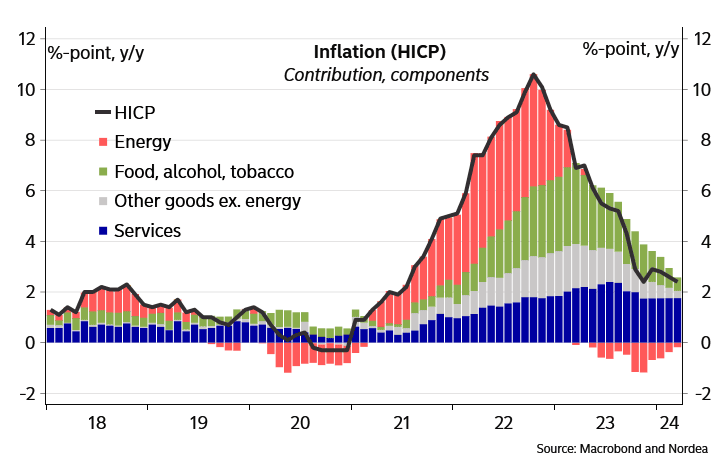Euro-Dollar: "Underlying Inflation has Risen Sharply Since the Beginning of the Year"
- Written by: Gary Howes

Image © Adobe Images
The Euro to Dollar exchange rate was softer following an undershoot in March inflation data, but looking under the hood reveals inflationary trends that will limit any weakness.
Eurozone CPI inflation fell to 2.4% year-on-year in March from February's 2.6%, according to Eurostat, undershooting expectations for a 2.5% print. The core inflation rate fell to 2.9% from 3.1%, undershooting the 3.0% expected by markets.
This undershoot explains a reactionary slide in Euro exchange rates, but there are details in the report that suggest any inflation-related weakness will prove limited.
"Underlying inflation has risen sharply since the beginning of the year," says Vincent Stamer, an economist with Commerzbank. He points out that the core index rose by 0.3% month-on-month in seasonally adjusted terms; the 5-month moving average thus continues its upward trend.
"Now that the dampening effect of energy prices on the core rate is fading, strong wage increases are helping the core index to rise more strongly again. According to ECB estimates, collectively agreed wages are likely to rise by an average of 4.5% this year. If this trend continues in the coming months, as we expect, core inflation will continue to fall slightly year-on-year until the middle of the year," says Stamer.
Commerzbank estimates that in the longer term, inflation should remain at 3%, above the ECB's target of 2%.
Compare EUR to USD Exchange Rates
Find out how much you could save on your euro to US dollar transfer
Potential saving vs high street banks:
$2,750.00
Free • No obligation • Takes 2 minutes
The European Central Bank (ECB) is priced to cut interest rates in June, but these inflation dynamics speak of a need to proceed slowly, limiting Euro-Dollar downside.
"We do not expect the ECB to hurry with their rate cuts and their recent communication has very much supported our expectation that a first rate cut will take place in June," says Tuuli Koivu, Chief Economist at Nordea Bank.
Eurozone services inflation remained steady at 4.0% in March, and as the below chart indicates, this stubbornness can severely limit the deflation process:
"We expect that service price inflation will continue to be elevated due to continuous wage pressures," says Koivu.
The ECB has said it will be highly attentive to this spring's wage negotiations and judges that high settlements would ensure services inflation remains elevated, ensuring a need to be vigilant on the future path of interest rates.
"Even if the ECB lowered slightly its projections on labour compensation for 2024-2026, the wage increases are expected to continue at relatively high levels which will boost unit labour costs assuming that there is no a significant positive surprise in productivity," says Koivu.
Nordea Bank expects the ECB to move only gradually when cutting interest rates, given the robust labour market development, which will keep service price inflation somewhat elevated.
"There are many indications that the ECB will make its first interest rate cut in June. According to our estimates, the ECB is also likely to reduce the deposit rate from the current 4.0% to 3.0% in a total of four steps by the first quarter. However, in view of the inflation rate, which is levelling off well above 2%, the central bank is likely to reconsider future interest rate hikes in the coming year," says Koivu.
All this points to ongoing Euro resilience, all else equal.
"The EUR/USD reached a new monthly low of 1.0725 last week, as expected. However, the momentum seems to have stalled for now, as the USD is overbought on a daily basis, suggesting a countermovement. The next short-term price target is 1.0830, which is also the 50 and 200-day moving average," says Christian Kwasnicki, Head of FX & Rates Advisory at Berenberg Bank.






